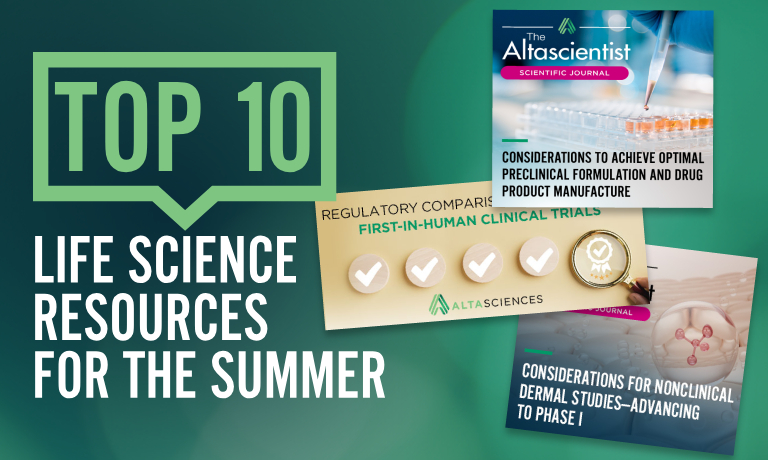The Altascientist Issue 41: Immunomodulation Assessments for Clinical Trials–Bioanalytical Approaches to Support Complex Modalities
Immunomodulatory drugs are at the forefront for the treatment of various types of cancer, infectious diseases, and numerous autoimmune diseases, including rheumatoid arthritis, type I diabetes, lupus, and multiple sclerosis. As the complexity of these therapeutics increases, so must the sophistication of the bioanalytical assays designed to either quantify them or measure their impact on the patient.
In Issue 41 of The Altascientist, we explore common classes of immunomodulators, bioanalytical methods used to quantify them, and their associated biomarkers. Featuring two scenarios that explore the complexities of bioanalysis for immunomodulators, The Altascientist offers practical considerations for ensuring accurate bioanalysis, as well as pharmacokinetic, pharmacodynamic, and safety data in clinical trials.
This issue also covers
- classes of immunomodulators, including monoclonal antibodies, CAR-T cells, and vaccines;
- immunotherapy trials, focusing on complex study designs and diverse patient populations; and
- bioanalytical methods and assays, including pharmacokinetics and anti-drug antibodies (ADA).
Listen or read Issue 41 of The Altascientist on altasciences.com, or wherever you listen to podcasts:

Immunomodulation Assessments for Clinical Trials
Immunomodulators can be broadly defined as immunostimulants and immunosuppressants, with many types of modalities. The growing understanding of the immune system's role in various diseases, along with advancements in drug development, have led to a natural evolution from traditional vaccines, small molecules, and cytokines, to increased targeted biologics and innovative approaches in gene therapy and vaccines.
“Each class of immunomodulator has a defined complexity and mechanism of action. Thus, the appropriate bioanalytical program will need to be carefully designed for the drug type and the intended purpose of the clinical study." – The Altascientist, Issue 41 pg. 2.
This includes careful consideration of pharmacokinetic and pharmacodynamic endpoints, as well as regulatory and bioanalytical requirements.
Particular attention is needed for monoclonal antibodies, CAR T-cells, antibody-drug conjugates (ADCs), and vaccines, as each class requires tailored strategies to support clinical studies and ensure accurate data collection.
Immunotherapy Trials
Clinical advances in immunotherapy have revealed the need for new or adapted approaches to trial design, and assessment of efficacy and safety in all phases of drug development. Some of the conventional statistical methods and endpoints used in oncology areas are less appropriate in immuno-oncology, while other methods and endpoints have emerged as alternatives.
In early-phase clinical trials, tests like biomarker, pharmacokinetic, and immunogenicity are used to support continued drug development, dose determination, and safety assessments. Immunomodulators tend to have longer half-lives than small molecules, which can lead to extended patient follow-up periods over many months. Multi-site trials are often needed, particularly for targeted therapies with strict patient criteria.
“Patient selection for specialized trials is a complex and rigorous process, requiring innovative trial designs that ensure the most appropriate subjects are selected, and that appropriate bioanalysis is integrated to establish the pharmacokinetic and pharmacodynamic of the immunomodulator.” – The Altascientist Issue 41, pg. 4.
Different bioanalytical methods and assays can be used for immunotherapy trials, each offering unique advantages depending on the study's goals. For example, ELISA and multiplexed assays are used for quantifying proteins or cytokines, ELISpot is ideal for detecting antigen-specific T-cell responses, flow cytometry helps assess cell populations and functions, and cell-based assays are essential for evaluating the functional activity of immune cells. Selecting the right assay depends on the specific immunomodulator and the clinical trial’s endpoints.
WHAT IS THE ALTASCIENTIST?
The Altascientist is a scientific journal written by the scientific and research experts at Altasciences. In each issue, they share their decades of knowledge to help sponsors along their early-phase drug development journeys, as well as explore the latest challenges and innovations in the industry.
Explore the full collection of The Altascientist in our Resource Center, or listen to each issue on our audiobook player.
View the full library of The Altascientist publications.
Browse the collection of The Altascientist audiobooks.



